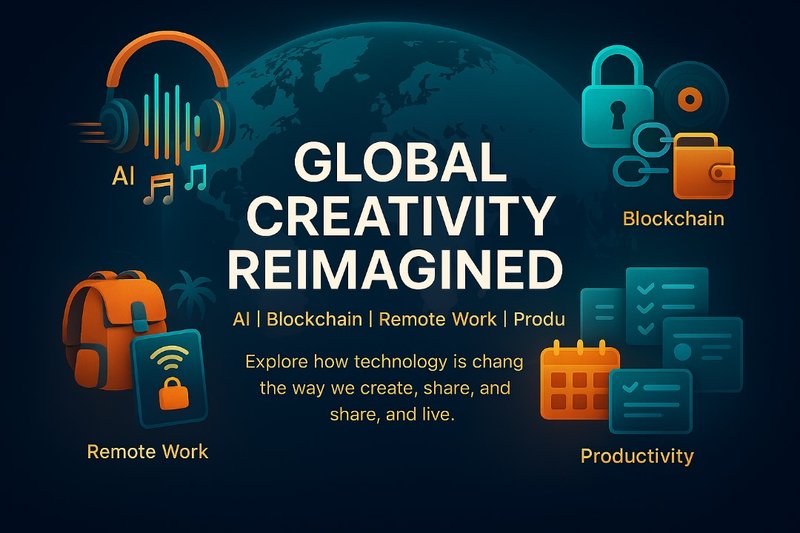Global Tech, Culture, and Lifestyle: 4 Ways the Digital World Is Redefining Creativity and Work
AI Tools Changing How Musicians Compose Worldwide
Artificial Intelligence is changing the way music is made — not just in Silicon Valley, but from Accra to Berlin. Musicians around the world are now collaborating with AI tools to speed up composition, explore new sounds, and even generate full tracks.
AI-powered platforms like AIVA, Amper Music, and Google’s Magenta Studio allow users to compose music by choosing moods, genres, and tempos. AIVA, for example, can create symphonies, cinematic scores, or lo-fi melodies in minutes. It’s not about replacing human creativity — it’s about unlocking new possibilities. A musician might use AI to lay down a baseline melody and then build on it with their own flair.
In Nigeria, rising Afrobeat producers are using Boomy to generate beats that match global charts. In Ghana, student DJs are experimenting with Loudly to learn tempo, layering, and genre-fusion production, even without formal music training.
AI voice synthesis is another game-changer. Artists can simulate backing vocals or experiment with vocal styles, harmonies, and languages — all within one platform. It saves time, lowers production costs, and makes music creation more accessible for solo or independent creators.
Still, AI music raises questions. Who owns the rights to an AI-generated song? Can AI capture raw emotion? These concerns are real — but many artists are embracing AI as a co-creator, not a replacement.
One global example is Taryn Southern, who released an album co-produced with AI. Locally, some Ghanaian gospel musicians use AI tools to structure their hymns and test arrangements before entering the studio.
As the tools evolve, the question is no longer if artists will use AI, but how they’ll use it to shape the next wave of global sound.
How Artists Are Using Blockchain to Protect Their Music
Blockchain is redefining ownership in music — giving power back to creators in ways the traditional industry never could. Artists can now register their songs on decentralized platforms like Audius, Opus, or Emanate, creating digital signatures that prove authorship and track usage globally.
Through smart contracts, blockchain ensures that every stream, download, or remix triggers an automatic royalty payment directly to the artist. This cuts out middlemen, delays, and unfair cuts from platforms or labels.
One case in point: RAC, a Grammy-winning producer, released an entire album on the Ethereum blockchain and earned more in 24 hours than a year of Spotify streams. This is a powerful signal — especially for emerging musicians.
In Ghana, where copyright issues often leave artists vulnerable, platforms like Audius are becoming attractive. Beatmakers and underground rappers are uploading their content to blockchain services to secure ownership and avoid theft.
NFTs (Non-Fungible Tokens) have added another layer of control and monetization. Artists can sell exclusive songs, behind-the-scenes content, or digital merch — and earn royalties every time it’s resold. Some even tokenize concert tickets, ensuring transparency and reducing fraud.
But blockchain also has hurdles: setting it up requires technical know-how, crypto wallets, and market awareness. Gas fees (transaction costs) can also fluctuate. It’s a promising frontier, but artists should tread smartly, ideally with guidance or education.
Still, as digital music consumption grows, blockchain is giving musicians what they’ve always asked for: ownership, control, and transparency.
The Digital Nomad Lifestyle: Could You Live Off Your Skills?
The digital nomad lifestyle is reshaping how people work and live. It’s not just about traveling — it’s about designing a life where your skills fund your freedom. Writers, designers, marketers, and even coders are packing their laptops and living wherever there’s Wi-Fi.
A digital nomad works remotely — from cafés, Airbnbs, co-working spaces, or beachside huts. The core requirement: a marketable digital skill and the discipline to deliver consistently.
Popular nomad-friendly jobs include:
-
Web design and development
-
Graphic design and illustration
-
Content creation and freelance writing
-
Virtual assistance and customer support
-
Language tutoring and online coaching
-
eCommerce, dropshipping, and digital marketing
Tools like Upwork, Fiverr, Toptal, and Remote OK provide global job listings, while Payoneer and Wise ensure smooth international payments. Some creatives even use crypto wallets to work with clients in different currencies.
But the lifestyle has real challenges: unstable internet, timezone fatigue, culture shocks, and isolation. Some nomads burn out due to lack of structure or community. That’s why many adopt the “slow travel” model — spending 1 to 3 months in one place to maintain balance.
A Ghanaian graphic designer, for instance, might base themselves in Cape Coast or Kumasi, working for US-based clients, earning in dollars, while living affordably and building their local brand. It’s a lifestyle built on self-discipline, curiosity, and adaptability.
Digital nomadism isn’t for everyone — but for creatives with the right mindset, it’s more than a dream. It’s a real path to location freedom, global collaboration, and creative exploration.
Top 5 Apps Creatives Use to Stay Productive Globally
Creatives today juggle multiple roles — marketer, producer, planner, editor. To stay organized and efficient, they rely on digital tools. Here are 5 of the most used apps worldwide in 2025 by artists, writers, designers, and freelancers.
1. Notion
A favorite among creatives for note-taking, project management, and journaling. Whether you’re planning your next video, sketching out song lyrics, or organizing a client list — Notion adapts to your flow. Templates allow fast setup, and it works offline too.
2. Canva Pro
Canva has revolutionized design for non-designers. With drag-and-drop ease, users can create album covers, social posts, presentations, and YouTube thumbnails. It’s cloud-based, supports team collaboration, and offers millions of royalty-free assets.
3. Trello / ClickUp
For managing tasks and timelines, Trello offers visual “boards” perfect for creatives who like to see their progress. ClickUp goes further — adding docs, time tracking, goal setting, and detailed analytics. Great for solo workers or small teams managing complex projects.
4. Descript
An all-in-one platform for podcasters and video editors. Descript transcribes your audio and lets you edit it like text — delete words, add music, generate captions. Musicians use it to tweak demos, podcasters love it for speed, and content creators use it for reels.
5. Slack / Discord
Communication is key, especially for remote creatives. Slack is ideal for client projects and business teams, while Discord works well for creative communities, artist collectives, and online support groups. Both allow real-time chat, file sharing, and idea exchange.
These apps aren’t just productivity tools — they’re the infrastructure of modern creativity. They help creators stay focused, collaborate globally, and maintain structure in the freedom of the digital world.
Real Talk: What to Watch Out For
While these innovations open doors, they also come with risks:
-
AI can lead to creative laziness or copyright gray areas
-
Blockchain requires understanding and carries market risks
-
Digital nomadism can isolate people if community is ignored
-
Relying too heavily on productivity tools can lead to burnout if balance isn’t maintained
That’s why the key in this new era is conscious creativity — using tech as a tool, not a trap.
The world is open. The tools are here. The question is: how will you use them to shape your own creative journey?
If you could master one thing from this list — AI music, blockchain for art, remote work, or productivity tools — which one would you choose and why? Drop it below.




Comments (0)
Leave a Comment
No comments yet. Be the first to comment!